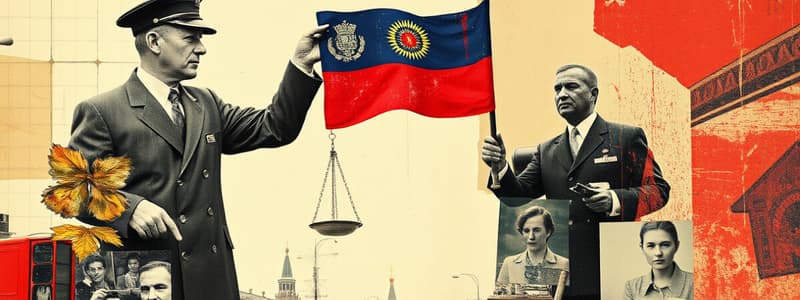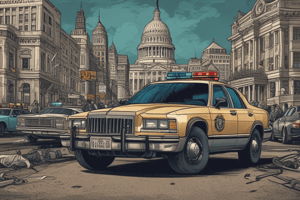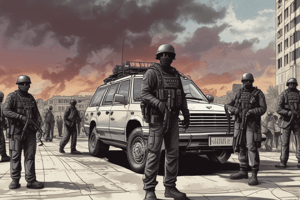Podcast
Questions and Answers
What is the primary balance that police officers must maintain while managing public order incidents?
What is the primary balance that police officers must maintain while managing public order incidents?
- Maintaining order without considering laws
- Enhancing protest group powers over public safety
- Balancing individual rights with community rights (correct)
- Prioritizing the needs of the police over citizens
Which legislation specifically protects the freedom of expression?
Which legislation specifically protects the freedom of expression?
- Criminal Justice and Public Order Act 1994
- Public Order Act 1986
- Human Rights Act 1998 (correct)
- Civic Government (Scotland) Act 1982
In the context of policing, the term 'mobbing' can refer to which of the following?
In the context of policing, the term 'mobbing' can refer to which of the following?
- Individual protest against authority
- A group acting with minimum disorder
- A peaceful gathering of individuals
- A collective act of public disorder (correct)
What is one key duty of police officers during public order incidents?
What is one key duty of police officers during public order incidents?
Which of the following is an alternate charge to mobbing and rioting?
Which of the following is an alternate charge to mobbing and rioting?
What is a police power associated with public order incidents?
What is a police power associated with public order incidents?
Which act emphasizes the balance of individual rights alongside public rights during policing?
Which act emphasizes the balance of individual rights alongside public rights during policing?
When policing a large crowd, what is a significant concern for officers?
When policing a large crowd, what is a significant concern for officers?
What is the consequence when a person refuses to remove their face covering when required by a Constable under section 60?
What is the consequence when a person refuses to remove their face covering when required by a Constable under section 60?
Which of the following acts outlines police powers related to public order incidents?
Which of the following acts outlines police powers related to public order incidents?
What is defined as a collective action that involves breaking the law?
What is defined as a collective action that involves breaking the law?
What essential element must be present for an act to qualify as rioting?
What essential element must be present for an act to qualify as rioting?
Which of the following best describes the power of stop and search at public order incidents?
Which of the following best describes the power of stop and search at public order incidents?
How is 'public assembly' defined in relation to police powers?
How is 'public assembly' defined in relation to police powers?
What charge can be considered as an alternative to mobbing and rioting?
What charge can be considered as an alternative to mobbing and rioting?
To what extent does the Section 60 power extend?
To what extent does the Section 60 power extend?
What is the primary purpose of the restrictions that may be placed on the right to freedom of peaceful assembly?
What is the primary purpose of the restrictions that may be placed on the right to freedom of peaceful assembly?
What must organizers of a public procession submit at least 28 days in advance?
What must organizers of a public procession submit at least 28 days in advance?
Which legislation grants Local Authorities the power to impose conditions on public processions?
Which legislation grants Local Authorities the power to impose conditions on public processions?
What kind of events are considered public processions?
What kind of events are considered public processions?
Which section of the law provides police with authority over public processions?
Which section of the law provides police with authority over public processions?
What criteria must the notice for a public procession include?
What criteria must the notice for a public procession include?
What is one of the key aspects of public order legislation?
What is one of the key aspects of public order legislation?
Which term best describes a gathering of people for a common cause?
Which term best describes a gathering of people for a common cause?
What is one possible police power associated with public processions?
What is one possible police power associated with public processions?
In the context of public order, what could be considered an associated offence?
In the context of public order, what could be considered an associated offence?
Which of the following is NOT a focus of public order legislation?
Which of the following is NOT a focus of public order legislation?
What is the primary purpose of employing significant policing resources at public processions?
What is the primary purpose of employing significant policing resources at public processions?
Which of the following scenarios illustrates the policing of a public assembly?
Which of the following scenarios illustrates the policing of a public assembly?
Which of the following statements regarding public order legislation is incorrect?
Which of the following statements regarding public order legislation is incorrect?
What is the main reason that a peaceful assembly might turn into a mob situation?
What is the main reason that a peaceful assembly might turn into a mob situation?
Under what circumstances may the charge of Mobbing and Rioting be applied?
Under what circumstances may the charge of Mobbing and Rioting be applied?
What essential factors influence police response to a crowd?
What essential factors influence police response to a crowd?
What is the legal definition of a mob, according to the provided content?
What is the legal definition of a mob, according to the provided content?
What actions can the duty Sergeant impose when they are the most senior officer present?
What actions can the duty Sergeant impose when they are the most senior officer present?
What sparked riots in cities like London in 2011?
What sparked riots in cities like London in 2011?
Why is it a crime at common law to form part of a mob?
Why is it a crime at common law to form part of a mob?
What could potentially transform a lawful assembly into an unlawful situation?
What could potentially transform a lawful assembly into an unlawful situation?
Study Notes
Learning Aim
- Understand legislation regarding public order, processions, assemblies, and police powers for managing crowds.
Key Learnings
- Police have significant resources to manage public events, ensuring safety and minimizing disorder.
- Balancing individual rights with public safety is a core duty of law enforcement.
Relevant Legislation
- Human Rights Act 1998: Guarantees freedom of expression (Article 10) and peaceful assembly (Article 11), subject to legal restrictions or penalties for safety and order.
- Civic Government (Scotland) Act 1982: Outlines local authorities' control over public processions.
- Public Order Act 1986: Provides police authority to impose conditions on public gatherings.
- Criminal Justice and Public Order Act 1994: Further expands police powers regarding public order incidents.
Public Processions
- All public processions (e.g., political marches, festive parades) are regulated by local authorities and may require police oversight.
- Organizers must give at least 28 days' notice to local authorities and police, detailing the event's specifics.
Mobbing and Rioting
- Mobbing involves a group acting unlawfully, creating alarm and breaching the peace.
- Rioting may ensue from lawful assemblies turning violent through interactions with protesters or police.
- Definition: "A mob is a group of persons acting together for a common illegal purpose to the alarm of the lieges and in breach of peace."
Police Powers
- Duty Sergeant present can impose conditions under Section 14 regarding crowd behavior.
- Power under Section 60 allows police to require individuals to remove face coverings, extending to vehicles.
- Police can stop and search individuals at public disorder incidents to maintain order.
Review Outcomes
- Understanding police powers related to public processions and offences.
- Ability to define public assemblies and police control measures.
- Knowledge of the definitions and essentials of mobbing and rioting.
- Recognizing alternative charges to mobbing and rioting.
- Clarity on police stop and search powers at public order events.
Studying That Suits You
Use AI to generate personalized quizzes and flashcards to suit your learning preferences.
Related Documents
Description
This quiz covers the key concepts of public order legislation as outlined in Unit 7, Lesson 6. The learner will explore the underlying principles, statutory frameworks, and implications for law enforcement. Prepare to test your understanding of this critical area of law.




